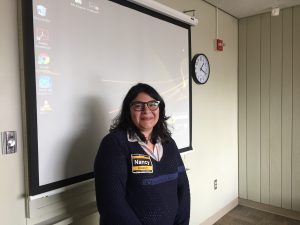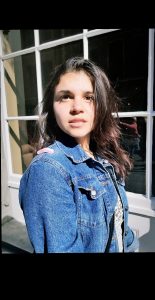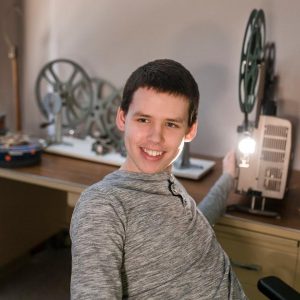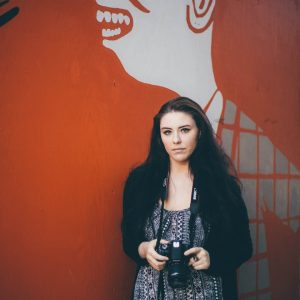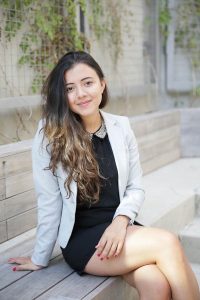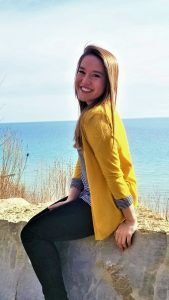Nancy Duque is a senior pursuing a second BS in Geosciences and Atmospheric Sciences with a first BS in Physics, specializing in Atomic, Molecular and Optics. She is currently doing research in geology and has worked under the direction of Dr. Dyanna Czeck since Summer of 2017. She has been studying the Pulo do Lobo rocks as part of the Southern Iberian Shear Zone in southwestern Spain. Shear zones are localized zones of deformation found deep in the crust cause by plate tectonic forces. The introduction of fluids may weaken rocks or facilitate localized deformation and metamorphic reactions, enhancing shear zones. Fluid-rock interaction in shear zones are recognized via altered rock chemistry, metamorphic reactions, and distinctive microstructural evidence. Doing a major element geochemical analysis of the additional samples in the PdL will help understand how fluids may have changed the geochemistry to learn about whether the fluids were responsible for strain localization. Nancy not only works on research but has the opportunity to work as a Geoscience 100 and Atmospheric Science 100 tutor through PASS, and an Undergraduate Mentor through the Go Forward program. Additionally, she works at Innovative Weather and is learning how to apply meteorological theory to operational forecasting in order to apply risk assessments for various utility, entertainment, and city clients. Nancy is involved in the Geology and Atmospheric Science Clubs, and will be the President of the Atmospheric Science Club this academic year. Ultimately, she wants to pursue a doctorate in Geosciences or Atmospheric Sciences, specializing in tectonics or air pollution, and research lightning to better understand its behavior through the thunderstorm lifecycle and alert forecasters on severe weather. Email: naduque@uwm.edu.
Margarita Garcia Rojas is a senior Latin American, Caribbean, & U.S Latinx studies student who has been working with Dr. Rachel Buff since May 2017 in creating the Documenting Deportation archive, the result of an international partnership between librarians, archivists, scholars, and students. Her work includes contextualizing Trump-era immigration policies by comparing them to policies of previous presidential administrations and analyzing the use of rhetoric and emotional impact it has had on documented and undocumented communities. She views the online articles as important historical documents. From September 2017 – May 2018 she also interned with Dr. Jasmine Alinder on the Lands We Share initiative, a part of the Wisconsin Farms Oral History Project, with a team of graduate students. They sought to trace the genealogy of people involved in urban agriculture in Milwaukee and the use of land while relating it to race and ethnicity. Margarita was born in Mexico, migrated with her family at the age of three, and has lived in Milwaukee ever since. Drawing from her own experience, her upcoming project will focus on the youth behind the immigrant rights movement in Milwaukee and the surrounding areas through collecting oral histories, archival research, and further analysis of news being reported in Wisconsin. In the future she plans to pursue higher education in History. Email: rojas2@uwm.edu.
Kristen Leer is a Ronald Reagan IB High School Alum and Milwaukee native. Currently, Leer is a McNair Scholar and part of the Honors College, majoring in Psychology, Classic Civilization, Religious Studies, and minoring in English. UWM has provided Leer opportunities over and beyond what she could have imagined. She currently is working with multiple research labs and projects at UWM. She has been working with Dr. Krista Lisdahl’s BrainLab on the Adolescent Brain Cognitive Development (ABCD) Study for over a year now. Leer has presented a poster, “Perceived Stress in Marijuana Using Adolescent and Young Adults,” to multiple conferences. Leer also works with Dr. Tina Frieburger’s Criminal Justice lab, collecting data on the opioid overdoses in Milwaukee. Leer is finishing up her Senior Thesis this fall and plans to present some of the findings in future conferences. Leer hopes that through her diverse disciplines she successfully is a competitive applicant for graduate school for her PhD in Psychology. This educational background will allow her to pursue her desire to write original academic research books and articles for the general public. Email: kaleer@uwm.edu.
Hugo Ljungbäck is a moving image artist, film curator, and peer-reviewed media scholar, pursuing a double major in Film and Media Studies. His film and video works have screened internationally at such venues as the Montreal Underground Film Festival, the Beijing International Short Film Festival, and Pixel Film Festival, and regularly explore queer themes, infidelity, sexual abuse, and coercion. Since April 2017, he has worked with Dr. Tami Williams in the Department of English/Film Studies on several projects, including the Media Ecology Project and rehousing the Pat Mellencamp 16mm Print Collection to the Center for 21st Century Studies. Currently, he is writing a microhistory of the UWM Film Studies Program. His scholarship has been published in the AM Journal of Art and Media Studies and The Projector: A Journal on Film, Media, and Culture, and he has presented papers at the Symposium for Media, Communication, and Film Studies Programs at Liberal Arts Colleges (MCFLAC) and the National Conference on Undergraduate Research (NCUR). His research interests include film, media, and critical theory; experimental film and video art; new media; and The Walt Disney Company. He is Chair of the UWM Moving Image Society, Managing Editor of Vernacular, and a programmer for the Milwaukee Underground Film Festival. Email: ljungba2@uwm.edu.
Sarah Philippi is a senior double majoring in Psychology and Biological Sciences (Cell and Molecular). She has been working with Dr. Karyn Frick since March of 2016 and has been supported by OUR extensively through the SURF program. During her freshman year, she began assisting on a project identifying sex differences in the rapid cell signaling mechanisms underlying the memory enhancing effects of 17β-estradiol (E₂) which has since been submitted for publication. Since then, she has worked on a project demonstrating that E₂ is necessary for Wnt/β-catenin signaling in the dorsal hippocampus of female mice and has spent her senior thesis researching the role of APOE genotype, sex, and 17β-estradiol in memory consolidation in a mouse model of Alzheimer’s disease. As a SERA recipient, Sarah will research the relationship between astrocytes and E₂ in memory consolidation in female mice infused with a viral construct containing inhibitory glial-specific Designer Receptors Exclusively Activated by Designer Drugs (DREADDs). Throughout her research career she has presented at MidBrains (received the Best Poster Award), the UWM Undergraduate Research Symposium (received ribbon for Outstanding Presentation), the UWM Neuroscience Symposium, and the National Conference on Undergraduate Research. With her remaining time at UWM she plans to continue researching in Dr. Frick’s lab and will serve as Vice President for Women in Medicine and Science (WIMS). In the future, she plans to pursue a PhD in Neuroscience, examining proteins and signaling pathways implicated in Alzheimer’s disease. Email: philip24@uwm.edu.
Diana Sofia Rivera is a senior Occupational Studies student, minoring in Psychology. She attended school in Colombia, South America, where she developed a keen interest in healthcare accessibility after participating in a student movement in favor of public healthcare. Consequent to this interest, she pursued research opportunities in the area of Social Policy and Public Health. She currently works with Dr. Mustafa Hussein in the Zilber School of Public Health studying factors such as types of healthcare systems and levels of health literacy that can affect the health outcomes and health inequalities of the population in a variety of countries. The research involves extensive literature search, review, synthesis of the evidence, and statistical analysis of cross-sectional data. The main purpose of this research is to contribute to the construction of social policy that can mitigate health inequalities. She also works as a Volunteer Paralegal at the university’s Legal Clinic. Email: riverads@uwm.edu.
Rebecca Willer is a senior Communication Sciences and Disorders student at the University of Wisconsin-Milwaukee. Rebecca is also a student in the Honors College and is working towards her Autism Spectrum Disorders Certificate. She is currently working with Dr. Sabine Heuer on a project that assesses the functional communication outcome measures that are used to evaluate people with dementia. The long-term goal of this research project is to develop a functional outcome measure that addresses communicative participation of people with dementia, because these assessments are lacking for this population. Rebecca has been actively involved in undergraduate research at UW-Milwaukee since the summer before her freshman year, when she participated in the UR@UWM Summer Research Program under Dr. Karyn Frick in the Psychology Department. Since then, Rebecca has worked with both Dr. John Heilmann and Dr. Shelley Lund in the Communication Sciences and Disorders Department working on various research projects that focus on topics such as language development of children in low socioeconomic statuses, language sample analysis, and functional outcome measures. After graduation, Rebecca plans to pursue higher education in Communication Sciences and Disorders in order to one day be a certified speech-language pathologist. Email: rwiller@uwm.edu.
